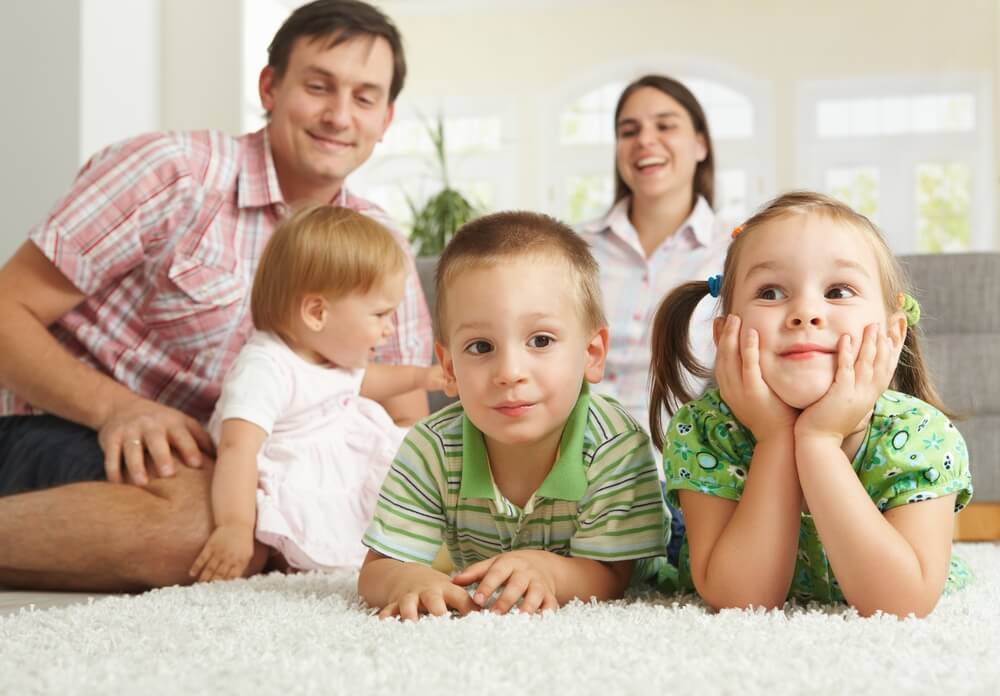The Inner Child of the Middle Child: What Is Middle Child Syndrome?

There’s been a lot of talks lately about something called middle child syndrome. Being a middle child definitely comes with its own unique set of challenges. Parents always have super high expectations for the firstborn, while the youngest one gets spoiled.
This leaves the middle child feeling left out and needing to compete for mom and dad’s attention.
Contents:
- Is it a Syndrome?
- Can Birth Order Affect Personality?
- Middle Child Stereotypes
- How it Manifests in Adulthood
- How to Handle Middle Child Syndrome Behavior
- FAQs
Is it a Syndrome?

StockLite/Shutterstock.com
Although the term middle child syndrome includes the scary word ‘syndrome’, it’s not an official psychological diagnosis. Middle child syndrome is a term that emerged in popular culture, not from scientific studies or trained therapists.
But do we really need to attach the word syndrome to it? Really? How would you like to have a word like that attached to your status in the family? How about this: first-born dysfunction, or, last-born affliction? Doesn’t feel so great, does it?
Still, the issue of how one’s placement in the order of siblings affects our lives is something we all think about from time to time. There are probably as many theories as there are people you ask.
There’s also been a lot of research on the issue of birth order and personality.
So, is there a middle child personality? Let’s see what the experts say about the personality traits of children based on birth order.
Can Birth Order Affect Personality?
Alfred Adler
Alfred Adler, an Austrian medical doctor and later psychotherapist in the early 20th century, was one of the first to talk about birth order and personality development.
Adler believed the firstborn feels the most powerful. They become more ambitious and determined. At the same time, as soon as the second child comes along, the firstborn starts to feel ‘dethroned’ and pushed aside.
The youngest child, according to Adler, is usually spoiled and doted over by the parents. This makes them dependent and selfish.
The middle child, however, represented a more complex situation. Adler identified several quite distinct personality characteristics that could emerge in the middle child. Some may become quiet sibling because they don’t have to deal with the same threats as the firstborn.
However, in other cases, the lack of attention could make them more competitive with their siblings to prove their worth. And in still other cases, the middle child may become rebellious and prone to challenge authority.

wavebreakmedia/Shutterstock.com
The Niche-Finding Theory
Another theory is referred to as the niche-finding model of birth order. This theory says that each child subconsciously assesses the dynamics of the family, and then figures out where they can fit best.
So, if the other sibling is conservative and calm, then the way to stand out is to become the wild child in the family. They may be perceived as the ‘problem child’, but at least they are not being left out. Even bad attention is still attention.
In other cases, the niche for the middle child might be the cooperative one. With the firstborn being the leader in the family, and the youngest child being the spoiled one, then being mild-mannered and cooperative carves out a viable role for the middle child.
What Does the Science Say?
Well, scientific studies have found inconsistent results. Yes, it’s hard to believe. Some studies find very clear links between birth order and personality, while others do not.
Probably one of the most comprehensive studies on birth order was actually completed just a few years ago. Researchers at the University of Leipzig in Germany analyzed data from more than 20,000 interviews with people in Germany, the U.K., and the U.S. That’s a lot of data.
What they found was a very small association between I.Q. and being firstborn, and nothing else. All other links between personality and birth order were simply not there. That’s a bit disappointing, but that’s the way the chips fall sometimes.
As it turns out, it’s not easy designing a study that can evaluate the link between birth order and personality. There are a lot of factors involved. For instance, the SES status of the family can affect the personality of the children, but SES usually changes from firstborn to last as parents climb the economic ladder.
Plus, each baby is born with a different temperament, which has a very strong effect on a personality all by itself, regardless of birth order. Then you have the discipline and parenting styles of parents that can be vastly different from family to family. So, it’s hard to compare one family to the next.
When you add all that up, you get a childhood phenomenon that has so many moving parts that it is nearly impossible to study scientifically.
Middle Child Stereotypes

fizkes/Shutterstock.com
Of course, what science says and what popular culture says are very different creatures.
Most people have stereotypes about what it’s like to be raised as a middle child. For example, a lot of people believe that since the firstborn was first, the parents are usually very devoted and try to do everything right. That means firstborns are taught self-discipline and to prioritize school.
By the time the middle child comes around, the parents are feeling a bit exhausted. They put so much energy into the firstborn, now they just don’t have the same enthusiasm for child number two.
So, parents can become a little bit lax in pushing the middle child to excel and do well in school. They might not be as attentive either, which makes the middle child feel a bit neglected and ignored.
Although it might not put the middle child on the path to clinical depression, feeling inferior and left out is not good for a child’s self-esteem either.
Another stereotype is that the middle child is a very sociable person. Because they didn’t receive much attention at home, they seek attention from sources outside the family. Obtaining approval from teachers can go a long way towards replacing missed attention from parents. That certainly makes sense to me.
Those are just a few of the stereotypes:
- Forgotten child
- Easily irritated child
- Inferiority complex
- Fixated on fairness
The middle child is also characterized as:
- Self-reliant and independent
- Overlooked or neglected
- Acting out for attention
- Not feeling close to their parents
How it Manifests in Adulthood
The middle child either grows up being the wild child in the family, or a people-pleasers that want everyone to get along. That’s quite the dichotomy.
On the one hand, because they feel neglected, they can become bitter and resentful. That can make them want to lash out at society. Being stubborn is a good way to get mom and dad’s attention, even as an adult.
On the other side of the coin, the middle child can evolve into a calm and well-adjusted human being. Because they grow up in the middle, they learn how to defuse arguments between the other siblings. So, they develop great conflict resolution skills.
How to Handle Middle Child Syndrome Behavior

Mladen Zivkovic/Shutterstock.com
So, what about if you’re the parent of a middle child? What should you do? Don’t worry, there are a lot of ways to help your middle child feel loved and cared for. Implementing the suggestions below may help avoid problems later.
Be Reassuring
Be reassuring. Let your middle child know that you love them just as much as their older and younger siblings. But remember, actions speak louder than words sometimes. So, consider sharing one-on-one time with them.
You can try to develop a hobby together or even just go for a weekly walk through the woods is a nice way to say ‘you are special and I value you’. Because the middle child can feel less important, it is extremely important that you don’t play favorites. Remember, every child is acutely perceptive of how each sibling is being treated.
Highlight Achievements or Interests
Highlight their achievements and interests. Since a middle child can feel ignored, it’s important to call attention to their accomplishments or things they show special interest in. Talk about them at the dinner table or post photos of their work on your social media accounts.
No Hand-Me-Downs
If possible, avoid the whole hand-me-down habit. Kids, especially teenagers, really need to feel special and distinct. They often do that through their clothes. It’s a way for a child to express their individuality.
If they have to wear their older sibling’s clothes, that takes a lot away from their need to feel unique.
Meaningful Conversations
Last but not least, communication, communication, communication. Yes, that seems to be every psychologist’s remedy for everything. That’s probably at least a little bit true, but that’s because open communication is really, really helpful.
No one is a mind-reader, and even though it may seem like everything is okay with your middle child, you never know. Some kids are just not very expressive about their feelings. So, it is important that you devote some time to a sit-down chat with your middle child; actually, each child.
Go for a Walk Together
Sometimes communication will flow more easily if it isn’t carried out in a manner that feels formal and serious. So, if you think the sit-down chat can come across as too much like parent/child therapy, try it in combination with that walk through the woods mentioned above.
When people are walking together, they aren’t face-to-face; that can take the pressure out of the situation and make it feel more relaxed. And, the repetition of walking can help release energy from the mind that has been bottled up inside. Walking and talking can help a lot.
Read also Child Jealous of Parents’ Affection.
FAQs

Источник: Reshetnikov_art/Shuttertock
Here’s a quick run-down of some frequently asked questions.
What are the Symptoms of Middle Child Syndrome?
- Easily upset and jealous
- Rebellious attitude and stubbornness
- Resentment when siblings are getting attention
What are the 5 Psychological Characteristics of the Middle Child?
- Temperamental
- Feelings of neglect
- Attention-seeking behavior
- Family peacemaker
- Seeking approval from outside, such as teachers
What are Middle Child Stereotypes?
- Rebellious wild child and free-spirited
- Natural diplomat and peacemaker
Is Being the Middle Child the Hardest?
Yes, and no. Yes, because they don’t get the same level of devotion as the firstborn or affection of the youngest child.
But also no, because each child has their own set of difficulties growing up. It’s hard to say that one child’s difficulties are harder than the others; especially during the teenage years when everyone’s life is an internal mess of strife and struggle.
Syndrome or Not, Each Child Needs You

Anna Om/Shutterstock.com
Of course, we all have a tendency to want to sort and package things that happen in life so that they’re easier to deal with. And that’s okay. It helps us manage a life that can get difficult from time to time.
So, while we can’t say that psychology has proven that middle child syndrome is a ‘real thing’, it’s still okay to see it as a unique phenomenon that our middle child goes through.
In fact, each child has their own, unique set of dynamics. It’s the parent’s job to make the necessary assessments and do our best to steer them to the path that is best for them.
It’s not easy. It’s not always well-received. But, it is our duty because that child did not ask to be brought into this world, and it can be a crazy world. Forming meaningful relationships with our children is never-ending. It will have its ebbs and flows, good times and not-so-good times.
Tell us what you think middle children are like. Which stereotype matches your experience? If you’re a parent of a middle child, what has worked for you to help them feel special and not neglected? Give us a few ideas, please.
The picture on the front page: shurkin_son/Shutterstock.com
Проверьте электронный ящик



















